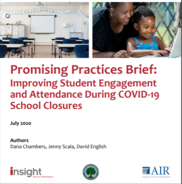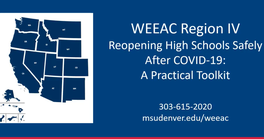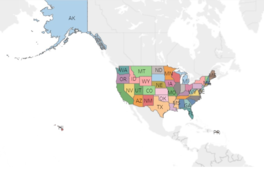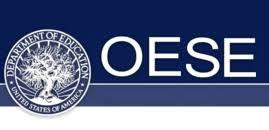
September 2020, Volume 1, Issue 8
Office of Elementary and Secondary Education
Office of State Grant and Program Support Newsletter

From the Deputy Assistant Secretary
Letter From Ruth Ryder, Deputy Assistant Secretary for the Office of State Grant and Program Support

Dear Partners and Stakeholders:
The 2020-2021 school year is officially upon us! Though the start of this school year is fraught with uncertainty, teachers and students are eager to reconnect and support each other to learn and grow, no matter the learning environment. OSGPS recognizes, as Secretary DeVos noted at the Kids First: Getting America’s Kids Safely Back to School roundtable in August, that there is not a one-size-fits-all approach to starting school this year. This month’s newsletter features resources focused on strategies for reopening schools after the COVID-19 disruption. We, and our technical assistance centers, stand ready to support school communities in the days and weeks ahead as you work to implement your plans for serving students and families at this critical time.
As many of you return to school, OSGPS will close one federal fiscal year and prepare for another. This means pausing to reflect on our work in 2020 — before COVID and during the pandemic.
This newsletter is one important piece of work our office implemented this year. Since its launch in February, our distribution list has grown to 6,959 readers! We are proud of this work, but we remain cognizant of the fact that we established this communication tool with a purpose: to provide our grantees and other stakeholders with updates and targeted resources that facilitate opportunities to share knowledge and improve practices in the field. To best understand if we are meeting our objective, we are asking for your input. We need feedback from you to ensure that the newsletter highlights information that is important to our readers and is presented in an easy to digest, reader friendly format. Please take a few minutes to complete this short survey. The results will inform our efforts to continuously improve upon our work to support you.
Finally, I want to draw your attention to important work that OSGPS, and other offices across the U.S. Department of Education, supported this summer: to rescind outdated guidance documents consistent with President Trump’s Executive Order 13891, “Promoting the Rule of Law Through Improved Agency Guidance Documents.” The order requires the Department to identify outdated, unnecessary, or ineffective guidance to rescind and to create a user friendly “guidance portal” linking to guidance documents currently in effect. OESE’s guidance documents remaining in effect are located on the Department’s Guidance Homepage. The list of guidance documents that have been rescinded can be found in the Federal Register notice here, published Aug. 31. Note that the rescinded documents are either outdated or superseded by more recent guidance documents.
All the best –
Ruth Ryder
|

Back to Learning Resources


Promising Practices Brief: Improving Student Engagement and Attendance During COVID-19 School Closures
Insight Policy Research and the American Institutes for Research recently published a report entitled Promising Practices Brief: Improving Student Engagement and Attendance During COVID-19 School Closures. This resource explores research on monitoring and promoting attendance and engagement in online learning settings and summarizes the findings from conversations held with a small number of school districts about their transition to remote learning as the COVID-19 pandemic unfolded. The brief provides states and districts with promising practices to measure and improve attendance and engagement during extended school closures.
|


Getting Schools Ready to Support Students Facing a New World of Challenges
Districts are working hard to develop back-to-school plans that meet the needs of all learners. They also must consider how to address the social-emotional needs of students. Getting Schools Ready to Support Students Facing a New World of Challenges,” a recorded webinar presented by IDRA EAC-South, is moderated by Paula Johnson and includes a panel of student advocates and education leaders. Participants discuss policy recommendations for district decision-makers on reopening schools that embrace restorative justice, ethnic studies, and culturally responsive practices. This webinar is a part of IDRA EAC-South’s School Reopening Webinar Series, which supports schools and districts in exploring what the future holds for school reopenings.
|


Impact Aid Program Back-to-School Tips
As schools prepare for the beginning of classes, now is the best time to make sure your Impact Aid information is up to date!
If you have not logged into your Impact Aid grant system account in the past 90 days, your account has been deactivated. Log into your account today to reactivate it.
If your district’s core user has changed, contact us now through the Get Help feature on our portal. Be sure to include the name of your school district, your current core user’s name and email address, and the name, job title, and email address of the person who will be the new core user. Doing this now will allow you to begin your application without problems.
Finally, please make sure your DUNS number is active and correct by visiting https://sam.gov. This will help to ensure that your payments reach you in a timely manner.
Visit our FAQs for additional information, or contact us for help at (202) 260-3858 or email us at Impact.Aid@ed.gov.
|


Reopening High School: Addressing Reopening Safely for Instruction after COVID-19
The Western Educational Equity Assistance Center (WEEAC) recently released a practical toolkit for planning a safe reopening of schools following the COVID-19 shutdown. The WEEAC’s “Reopening High School: Addressing Reopening Safely for Instruction After COVID-19” video presentation and brief provide educators with tools for reopening districts and high schools to ensure all groups of students achieve at high levels.
|


Regional Educational Laboratory Report: How High School Students Use Flexible Time to Personalize Their Education
To personalize education, Legacy High School in Bismarck Public Schools, North Dakota, implemented a schedule that allows students to choose how they use a portion of the school day outside of their regularly scheduled classes. Teachers may also determine how students use some of their flexible time, called “flex-time.”
Leaders at Legacy High School and Bismarck Public Schools partnered with Regional Educational Laboratory Central to examine how students used their flex-time and whether students with different demographic characteristics and academic achievement levels used their flex-time differently. Read the report here.
|


Reopening Schools During COVID-19: Understanding Possible Models, Stakeholder Needs, and Best Practices to Advance Educational Equity
The Mid-Atlantic Equity Consortium (MAEC), which operates the Center for Education Equity, recently published a literature review of resources from government agencies, nonprofits, newspapers, and teachers unions to identify the best practices for educators, families, and students on how to center equity when addressing COVID-19 and school reopenings in the fall. The resources specifically identify the impact of COVID-19 on students of color, English language learners, LGBTQIA+ students, rural students, students experiencing homelessness, students with disabilities or diverse needs, and undocumented students.
|


School Reopening Plans: State Resource Map
MAEC also offers this map that details school reopening plans by state as well as additional resources for individuals and families to help them access support and important information the pandemic (e.g., COVID-19 communications, reporting hate crimes, free food for children).
|

Technical Assistance Resources and Updates

Human Trafficking Prevention Resources
This year marks the 20th anniversary of the passage of the Trafficking Victims Protection Act. In recognition of this milestone, the Department’s Office of Safe and Supportive Schools conducted a webinar series to highlight and support the growing response of America’s schools to child trafficking. The events attracted significant public interest, with over 2,000 registrants combined. Given the strong response to the webinars already completed, links to on-demand versions are now available. Related resources, recommended by subject matter experts, are also archived at the links provided below.
“Identifying and Supporting Students Affected by Human Trafficking,” Jan. 30 — This event provided an overview of child trafficking and described the latest strategies being used to identify and support students impacted by trafficking.
“Human Trafficking: Online Safety,” June 17 — In light of the COVID-19 pandemic and the resultant increase in young people’s online exposure, this event featured strategies in the online space to prevent human trafficking and child labor exploitation.
“Addressing Human Trafficking: An Expanded Look at Online Safety,” Aug. 27 — During this event, subject matter experts who work directly with survivors of trafficking and those who support them addressed educators' questions compiled from the June 17 webinar.
These resources provide administrators, teachers, specialized instructional support personnel, parents, caregivers, and students with trauma-informed and survivor-centered strategies and information to mitigate trafficking activity. Additional webinars are being planned for fall/winter 2020. Please watch this newsletter for more details.
|

Upcoming Due Dates and Event News
Due Dates and Competitions

Funding Updates from the Office of Indian Education
The Department’s Office of Indian Education's (OIE’s) FY 2020 Accessing Choice in Education, State Tribal Education Partnership programs and the Native American Language Program discretionary grant competitions recently closed. OIE will hold peer review panels and will make new awards later this month. Stay tuned!
In August, formula grant award notifications (GANs) were sent out through G5. Check your grant messages inbox for more detail. Please note that your new GAN has updated program officer information. Please reach out to your new Department contact for your technical assistance needs.
Also, a grant management webinar will occur in mid-September. The slide deck will be available on the Formula Grant EASIE Additional Resources page.
|
Event News

Office of Migrant Education Meetings
The Department’s Office of Migrant Education (OME) is hosting its virtual High School Equivalency Program (HEP) and College Assistance Migrant Program (CAMP) annual directors’ meeting from Sept. 14 to 16. Session topics will include annual performance reporting and starting projects successfully in the fall, among others. The event is open to recipients of the HEP and CAMP grants.
OME also hosted a webinar on Aug. 13 for HEP and CAMP directors on HEP and CAMP project implementation of Secretary DeVos’s Final Supplemental Priorities and Definitions for Discretionary Grant Programs. The HEP webinar addressed the priority for fostering flexible and affordable paths to obtaining knowledge and skills. The CAMP webinar addressed the priority for promoting science, technology, engineering, or Math (STEM) education, with a particular focus on computer science. During these webinars, grantees shared their approaches to addressing these priorities in their projects.
|
If you know someone who would like to subscribe to the SGPS Newsletter, encourage them to sign up HERE! This link also will allow subscribers to manage their subscriber settings and unsubscribe.
Check out more Department of Education News and Alerts resources, including:
This newsletter may reference and contain links to external sources. The opinions expressed in these sources do not reflect the views, positions, or policies of the U.S. Department of Education, nor should their inclusion be considered an endorsement of any private organization.
|







